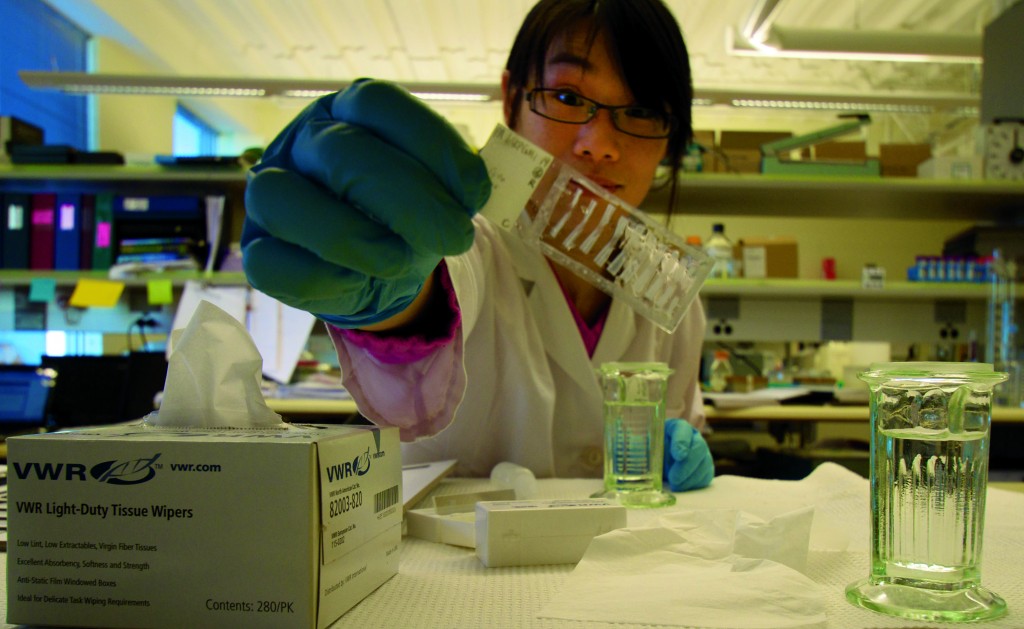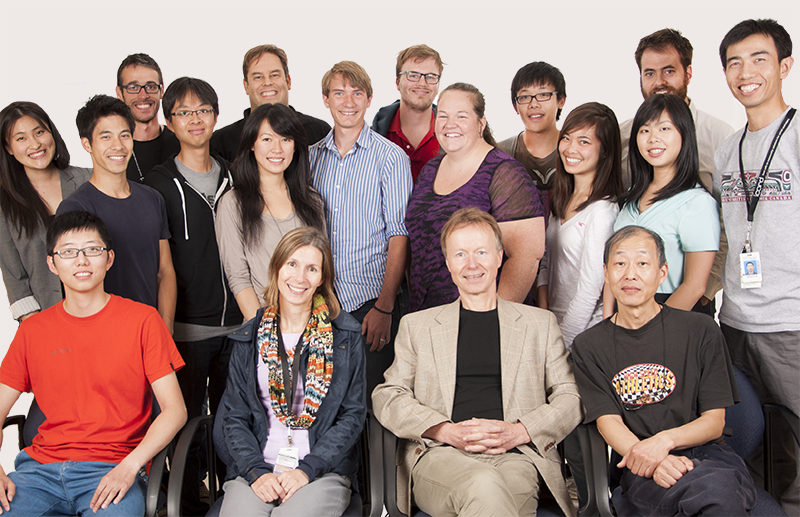
Principal Investigator
Past Director, ICORD (2012-2023)
M.D. (University of Essen), Dr.Med. (Ruhr-University Bochum), Ph.D. (University of Calgary)
John and Penny Ryan BC Leadership Chair in Spinal Cord Research
Professor, Department of Zoology, Faculty of Science, University of British Columbia
Professor, Department of Surgery, Faculty of Medicine, University of British Columbia
Research Interests
Cell transplantation; Diet; Myelin; Neural repair; Neuroprotection; RegenerationDr. Tetzlaff is currently focused on two distinct areas of research. The first focuses on early strategies that will assist in protecting against secondary damage after SCI, termed neuroprotection. After an injury, there is the possibility of a cascade effect, which involves a chain of secondary injuries. Neuroprotective strategies would work to mitigate further injury by preventing cascade effects. To this end, he is studying dietary strategies, like the ketogenic diet and every-other-day fasting (EODF). His second area of research is focused on repair, since you cannot protect against all injury. To re-connect with other neurons and restore function following injury, nerve fibres must grow across the lesion or injury site. Unfortunately, spinal cord cells are unable to regenerate in this way. Currently, Dr. Tetzlaff is using approaches such as gene manipulation to enhance the regenerative potential of nerve fibers. He is also working on remyelination strategies, which involves the construction of new myelin sheathes to replace those lost from the nerve fibers due to injury. In the brain and spinal cord, myelin helps neurons function more efficiently by wrapping around them and could also protect them from additional damage.
Dr. Tetzlaff was the Director of ICORD from 2012 to 2023. He is a Professor in the Departments of Zoology and Surgery at the University of British Columbia. He also holds the Edie Ehlers Chair in Spinal Cord Research. He obtained his M.D. at the University of Essen, completed his Dr. Med. at Ruhr-University Bochum and his Ph.D. at the University of Calgary.
His ultimate vision is to combine multiple strategies to encourage nerve cells to grow and enhance recovery after SCI. Nerve fibres lose their myelin sheaths after an injury and Dr. Tetzlaff’s lab is working to determine whether what they see in their models can be translated to clinical practice.
In Dr. Tetzlaff’s opinion, the greatest thing about working at a centre like ICORD is the ability to collaborate in discussion and dialogue amongst diverse groups all working on the same issues, but from different perspectives. Being able to have frank, open discussions, even disagreements, allows a much greater understanding of the challenges faced by everyone and leads to new innovative solutions.
Recent collaborations:
Dr. Tetzlaff has been working closely with the Orthopaedic Injury Biomechanics Group, headed by Drs. Tom Oxland and Peter Cripton, on how different biomechanic mechanisms influence injury, and what happens in the different injury models.
He also works with Dr. Brian Kwon on pre-clinical and translational studies, discussing what scientists should see or request as part of developing a road map to a clinical trial.
Dr. Tetzlaff has been actively engaged in a collaboration involving several researchers nationwide to find an ideal cellular source for transplantations after injury. In particular, he is testing the potential of Schwann cells derived from Skin progenitor cells that were previously discovered in the laboratory of Dr. Freda Miller at the University of Toronto (Hospital for Sick Children Research Institute). Dr. Tetzlaff is also collaborating with Dr. Samuel Weiss (Department of Cell Biology & Anatomy, University of Calgary) on studying another newly discovered neural cell.
Major Findings:
Dr. Tetzlaff’s work with diet produced several significant findings. The ketogenic diet is a high fat, adequate protein, low carbohydrate diet which is used to treat epilepsy. Dr. Tetzlaff’s work on the diet showed it to be neuroprotective and successful in improving outcome after cervical SCI. He also demonstrated that every-other-day fasting (EODF) is neuroprotective, even when started at time of injury, and promotes neural plasticity and recovery of function after cervical SCI without causing weight loss.
One approach to improve neural regrowth and remyelination is cell transplantation. Dr. Tetzlaff discovered that when skin-derived cells, called Schwann cells, were transplanted into the injured spinal cord, they were able to create a bridge across the lesion site and allow neural regrowth and remyelination. The transplantation of these cells was associated with improved recovery of function. This work is groundbreaking because skin is an easily accessible source and these cells could be a potential new treatment for SCI.
Dr. Tetzlaff’s work on minocycline, a drug used clinically to treat SCI, showed that it is neuroprotective after SCI. The success of a delayed intervention with the drug is contributing to the rationale for clinical “off label” usage trials.
His landmark work demonstrated that chronically injured rubrospinal neurons survive for more than a year, and that these neurons can be rescued and stimulated to regenerate after SCI. This work was recognized by the National Institutes of Health as being “utmost important” and lead to a contract at the Reeve-Irvine Institute to replicate his data.
Techniques employed in the lab:
- Confocal microscopy
- Electron microscopy
- Electrophysiology
- Genetic manipulation in models
- Modeling SCI
- Molecular biology and biochemistry: western blotting, gene expressing tools
- Stem cell and cellular transplantation
Affiliation with organizations and societies:
- Scientific Advisory Committee, Christopher and Dana Reeve Foundation (CDRF)
- Review Committee, Canadian Institutes of Health Research (CIHR)
- Scientific Advisory Board, Kentucky Spinal Cord Injury Research Center (KSCIRC), University of Louisville
- Editorial Board, Journal of Neurorehabilitation & Neural Repair (NNR)
- Advisory Board, Paralyzed Veterans of America (PVA)
Awards
Some of Dr. Tetzlaff’s recent major awards and accomplishments include:
- King Charles III Coronation Medal, Governor General of Canada (2025)
- Chair in Spinal Cord Research (UBC & Rick Hansen Institute, 1995)
- Nominee for teaching award (University of Calgary)
Current Lab Members
| Undergraduate Students | Masters Students | Ph.D. Students | Postdoctoral Fellows | Research Staff |
|---|---|---|---|---|
| Shim Gicole | David Park | Sarah Wheeler | Dr. Bethany Kondiles | David Hyo-Joon Park |
| Helen Azar | Saina Nemati | Katherine Jeffris | Dr. Ward Plunet | |
| Samiha Hossain | Katelyn Hudak | Eric McGinn | Dr. Oscar Seira | |
| Michelle Poovathukaran | Mohammad Shaikh Esmaili | Sam Duenwald | ||
| Saralynn Lai | Navid Hajati | Elizabeth Raffaele | ||
| Ankita Bawar | Haley Briggs | |||
| Claire Cunningham | Aidan Loong | |||
| Neilan Tan | Min Lu | |||
| Oliver Hedzelek | Alex Burden | |||
| Nathan Yung | Michelle Poovathukaran | |||
| Nima Teymouri | ||||
| Jun Liu | ||||
| Julia Ternier | ||||
| Harjas Gill | ||||
| Celine Xu | ||||
| Alia Alaryani |
Trainee Awards
| Year | Name | Award |
| 2025 | Dr. Bethany Kondiles | Wolfram Tetzlaff Mentorship Award, ICORD |
| Saina Nemati | Edward Squires Memorial Scholarship, UBC | |
| 2024 | Sarah Wheeler | ICORD Travel Award |
| Saina Nemati | BPOC Graduate Excellence Award, UBC | |
| 2023 | Sarah Wheeler | Second Place PhD Poster, ICORD ARM |
| Sam Duenwald | Second Place Undergrad Poster, ICORD ARM | |
| Hyo Joon David Park | W.L McLeod Prize, ICORD ARM | |
| Dr. Bethany Kondiles | Paralyzed Veterans of America Research Foundation Fellowship Grant, Paralyzed Veterans of America Research Foundation | |
| 2022 | Saina Nemati | First Place Undergrad Poster, ICORD ARM |
| Dr. Bethany Kondiles | ICORD Trainee Travel Award | |
| Dr. Jie Liu | ICORD Lifetime Achievement Award | |
| Katherine Jeffris |
|
|
| 2022-2023 | Katherine Jeffris |
|
| 2022-2023 | Nima Alaie | endMS Doctoral Studentship Award, MS Society of Canada |
| 2021-2022 | Nima Alaie | MS Scholar Program for researchers in Training, MS Society of Canada |
| 2016 | Greg Duncan |
|
| Brett Hilton | Canadian Graduate Scholarship – Doctorate level (CIHR) | |
| 2015 | Peggy Assinck |
|
| Sheida Naderi-Azad | End MS Summer Studentship (MS Canada) | |
| 2013 | Greg Duncan | Top Poster Award, Canadian Spinal Cord Conference |
| 2013-2016 | Brett Hilton | Frederick Banting & Charles Best Canada Graduate Scholarship Doctorate level, Canadian Institutes of Health Research |
| 2012-2015 | Peggy Assinck | Frederick Banting & Charles Best Canada Graduate Scholarship Doctorate level, Canadian Institutes of Health Research |
| 2012-2013 | Greg Duncan | Doctoral Studentship Award, Multiple Sclerosis Society of Canada |
| 2011 | Greg Duncan | Paralyzed Veterans of America Poster Award at the 14th International Symposium on Neural Regeneration |
| 2010 | Peggy Assinck | Best Poster Award at the Stem Cell Network Annual General Meeting
2nd Place for Presentation at the Vancouver Coastal Health Transplantation Research Day |
| 2009 | Peggy Assinck | Frederick Banting & Charles Best Canada Graduate Scholarship – Master’s Level (Canadian Institutes of Health Research) |
Current Opportunities in the Lab
Please contact Dr. Tetzlaff with inquiries.
Video
Dr. Tetzlaff presents at the announcement of the Blusson Integrated Cures Partnership, April 12, 2013
Watch a video of a presentation given by Dr. Tetzlaff on the state of stem cell research in Canada: what exactly is going on in Canada, the provinces, and here at ICORD, and where Canadian research policy stands on stem cell research.
Recent publications
- Bourguignon, L et al.. 2025. Author Correction: Impact of commonly administered drugs on the progression of spinal cord injury: a systematic review.. Commun Med (Lond). doi: 10.1038/s43856-025-01345-0.
- Zia, S et al.. 2025. Age-impaired remyelination is associated with dysregulated microglial transitions.. Nat Commun. doi: 10.1038/s41467-025-64906-w.
- Kondiles, BR, Fan, J, Cheng, WH, Wellington, C, Tetzlaff, W. 2025. Age and Sex Affect the Chronic Trajectory of Plasma Neurofilament Light and Glial Fibrillary Acidic Protein Levels in a Murine Thoracic Contusion Spinal Cord Injury Model.. Top Spinal Cord Inj Rehabil. doi: 10.46292/sci25-00031.
- Kondiles, BR, Tetzlaff, W. 2026. Improving recovery from traumatic spinal cord injury: Targeting remyelination versus white matter remodeling.. Neural Regen Res. doi: 10.4103/NRR.NRR-D-24-01628.
- Lam, MH et al.. 2025. Interpretation of inhomogeneous magnetization transfer in myelin water using a four-pool model with dipolar reservoirs.. Magn Reson Med. doi: 10.1002/mrm.30465.



